Silent Night, Holy Wonder: Christmas Through the Eyes of Shepherds
- Randyb Dinwiddie
- Nov 26, 2025
- 6 min read
On a hillside outside Bethlehem, under a canopy of stars that had witnessed countless ordinary nights, a group of shepherds huddled around their small fire. The wind carried the familiar sounds of their flock, gentle bleating, the rustle of wool against wool, the soft padding of hooves on rocky ground. These were men accustomed to solitude, to long watches through the darkness, to being forgotten by a world that needed their work but looked down on their station.
They were society's outcasts, these keepers of sheep. Their occupation made them ceremonially unclean, unable to participate fully in religious life. Their testimony held no weight in courts of law. They lived on the margins, trusted with valuable flocks but trusted with little else. Yet on this night, this holy, silent night, Heaven would choose them for the greatest announcement in human history.
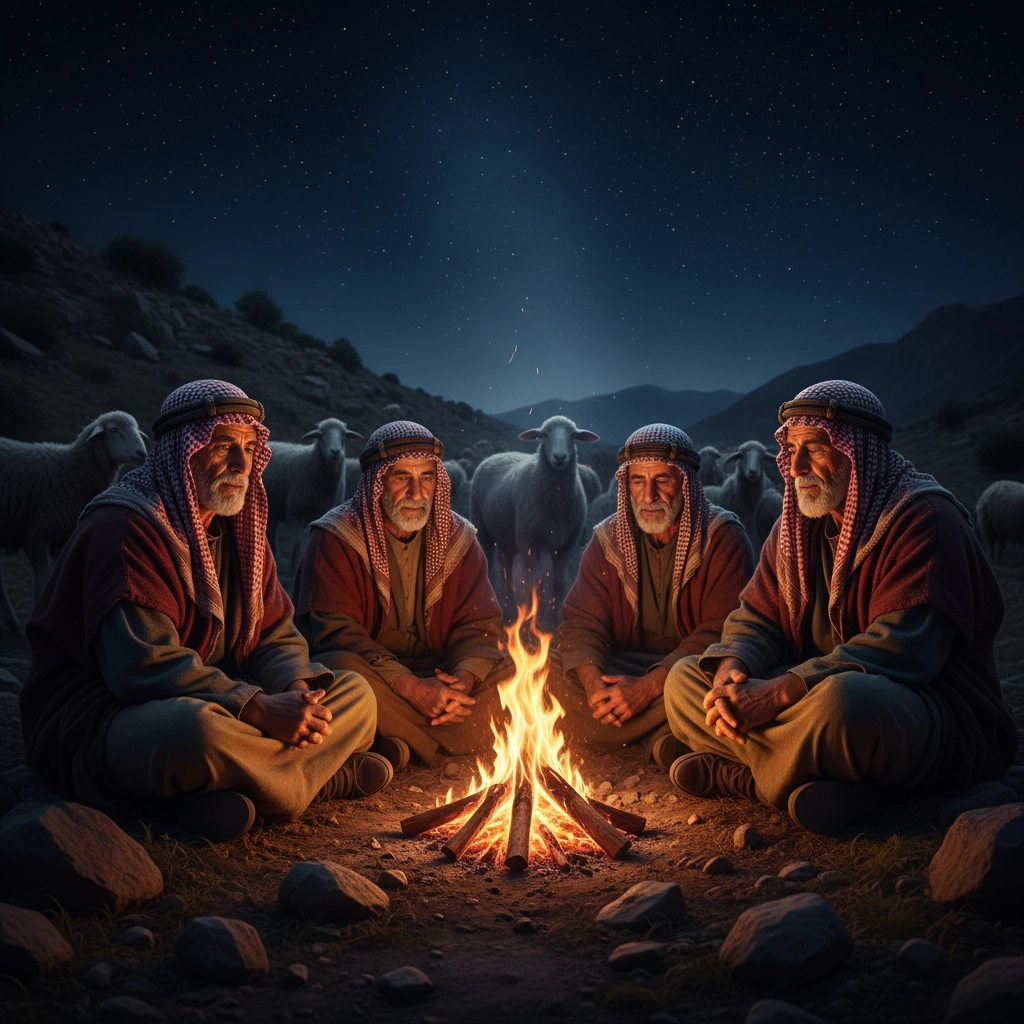
The Humble Watchers
"And there were in the same country shepherds abiding in the field, keeping watch over their flock by night" (Luke 2:8, KJV). This simple verse captures the ordinary nature of their evening. These weren't kings in palaces or priests in temples. They were working men doing their job, protecting sheep from wolves and thieves, ensuring that not one lamb would be lost on their watch.
The irony is breathtaking when you consider it. Here were men whose daily work involved caring for sheep, the very animals that would be sacrificed in the temple for the forgiveness of sins. Night after night, they tended flocks that would become offerings, never knowing they were about to witness the arrival of the ultimate Lamb of God, the one who would take away the sins of the world.
Their work required vigilance. Predators prowled in darkness. Bandits struck when guards were sleepy. But this night, their watchfulness would be rewarded with a vision that would change everything they understood about God's love for the humble and forgotten.
The Sky Tears Open
"And, lo, the angel of the Lord came upon them, and the glory of the Lord shone round about them: and they were sore afraid" (Luke 2:9, KJV).
Imagine their terror. One moment, they're warming their hands over glowing embers, perhaps sharing bread or discussing the day's challenges. The next, the very fabric of night is ripped apart by divine light. Not the gentle glow of stars or the warm flicker of their fire, but the blazing glory of Heaven itself, so bright it turned midnight into day.
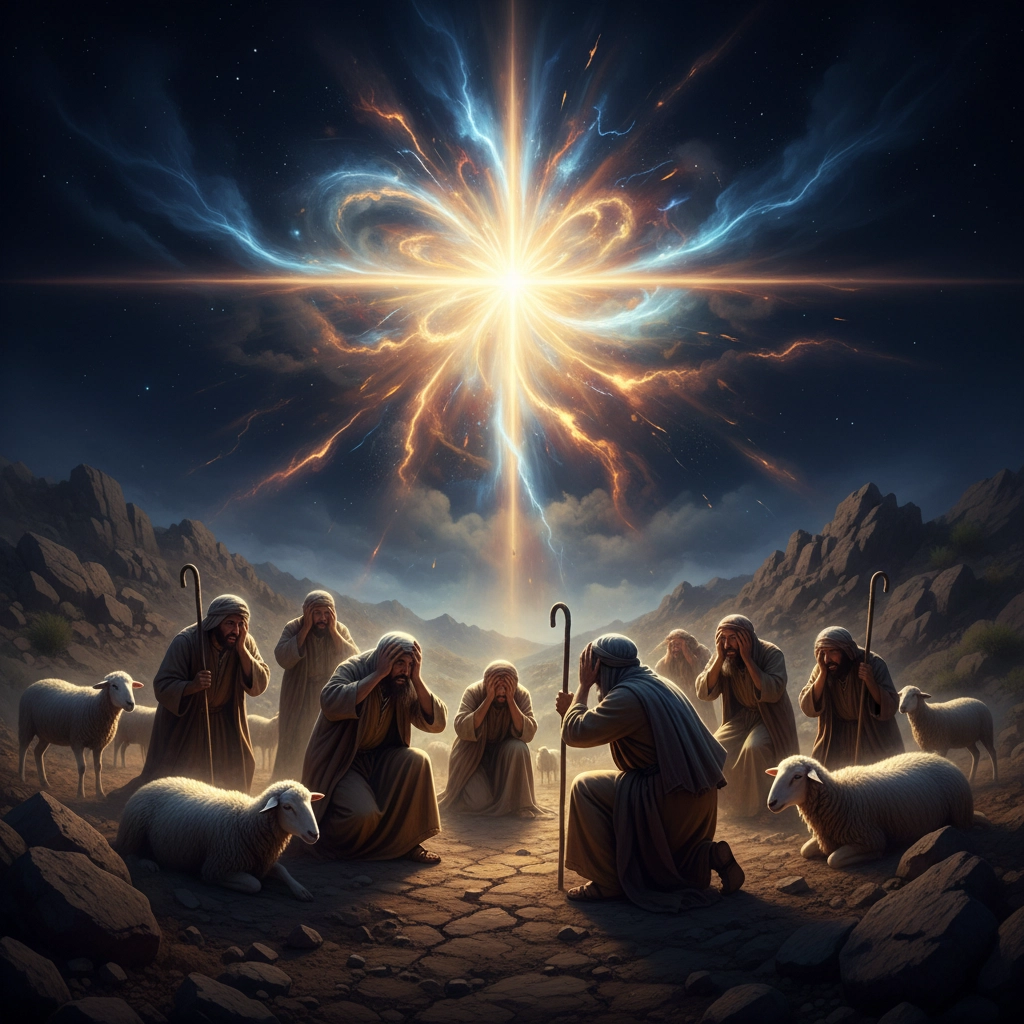
This wasn't a peaceful, comforting presence. The original language suggests they were "greatly afraid", seized with overwhelming terror at the supernatural power radiating around them. These were tough men, accustomed to facing wolves and storms, yet they trembled before this holy brightness. The very ground they stood on had become sacred space, and they knew instinctively they were in the presence of the divine.
The angel who appeared wasn't the cherubic figure of Christmas cards, but a mighty messenger of God whose presence was so overwhelming that his first words had to be, "Fear not!" These weathered shepherds, who faced danger nightly, were undone by holiness.
The Greatest News Ever Told
"And the angel said unto them, Fear not: for, behold, I bring you good tidings of great joy, which shall be to all people. For unto you is born this day in the city of David a Saviour, which is Christ the Lord" (Luke 2:10-11, KJV).
Picture the angel's voice cutting through their terror with words that would echo through eternity. "Fear not." The command was both gentle and authoritative, a divine hand reaching down to lift their hearts from terror to wonder. And then came the announcement that changed everything: a Savior had been born.
Not just any child, but the Christ: the long-awaited Messiah. The One their ancestors had hoped for, prayed for, died waiting for. He had come, and they: humble, unimportant shepherds: were the first to know.
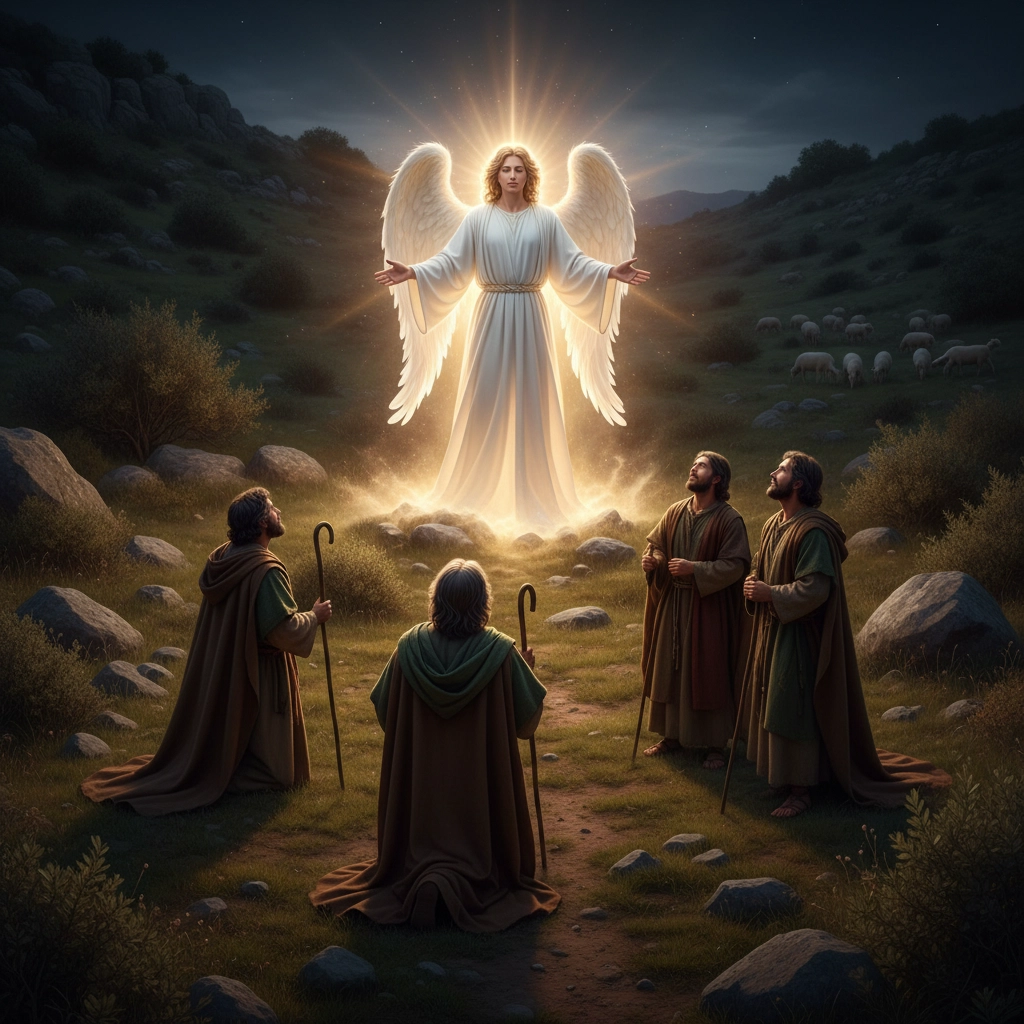
The angel gave them a sign: "And this shall be a sign unto you; Ye shall find the babe wrapped in swaddling clothes, lying in a manger" (Luke 2:12, KJV). How perfectly this spoke to their hearts. Not in a palace cradle, not surrounded by wealth and power, but in a manger: a feeding trough for animals. The Messiah had come not to the mighty, but to the lowly. Not to those who expected Him in glory, but to those who would recognize Him in simplicity.
Heaven's Choir
Just as their minds began to grasp this impossible news, something even more magnificent happened: "And suddenly there was with the angel a multitude of the heavenly host praising God, and saying, Glory to God in the highest, and on earth peace, good will toward men" (Luke 2:13-14, KJV).
The NIV translates this as "peace to those on whom his favor rests," and in that moment, these shepherds understood something profound: God's favor rested on them. Not because they deserved it, not because they were important in the world's eyes, but because God's love reaches to the forgotten, the marginalized, the humble.
Imagine the sound: not one voice, but a multitude of angels singing in perfect harmony. The music of Heaven itself filling that hillside, proclaiming glory to God and peace on earth. The shepherds witnessed a concert that no earthly choir could match, heard a song that proclaimed the very purpose of Christ's coming: to bring peace between God and humanity.
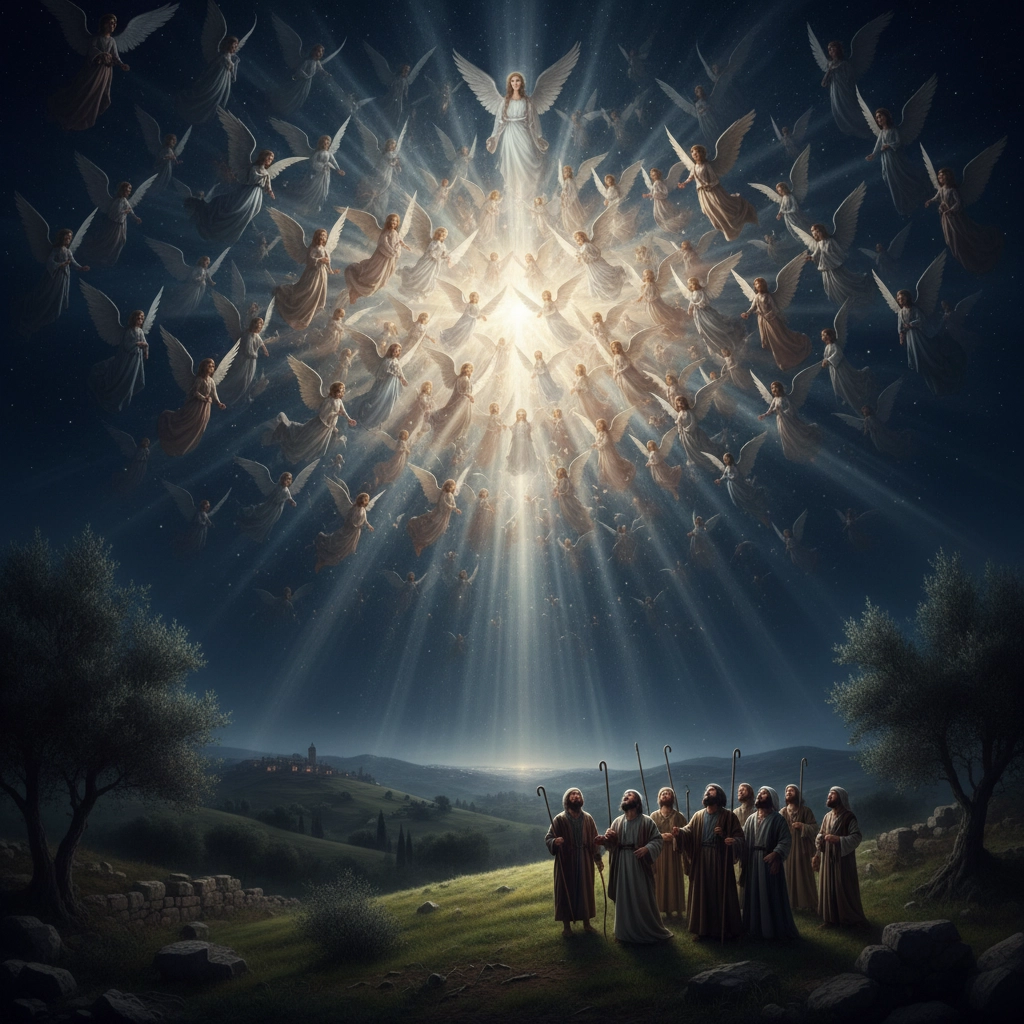
The Journey of Faith
"And it came to pass, as the angels were gone away from them into heaven, the shepherds said one to another, Let us now go even unto Bethlehem, and see this thing which is come to pass, which the Lord hath made known unto us" (Luke 2:15, KJV).
When the light faded and the music stilled, when the hillside returned to ordinary darkness, the shepherds faced a choice. They could dismiss what they'd seen as a dream, return to their normal watch, and pretend nothing had happened. Or they could believe, act on faith, and go see for themselves.
Their response reveals the heart of faith: "Let us go and see." They didn't hesitate or debate. They didn't worry about leaving their flocks unguarded or question whether they were worthy to visit the promised Messiah. They simply went, their hearts burning with holy curiosity and growing wonder.
The journey from the hillside to Bethlehem wasn't just a walk through the night: it was a pilgrimage of faith, each step carrying them closer to the fulfillment of humanity's greatest hope.
The Holy Family
"And they came with haste, and found Mary, and Joseph, and the babe lying in a manger" (Luke 2:16, KJV).
They found exactly what the angel had promised: no palace, no royal nursery, but a simple stable. A young mother, a carpenter, and a baby lying in a feeding trough. To the world's eyes, it would have seemed like the most ordinary of scenes. But to these shepherds, who had seen Heaven tear open and heard angels sing, this was the most sacred sight in history.
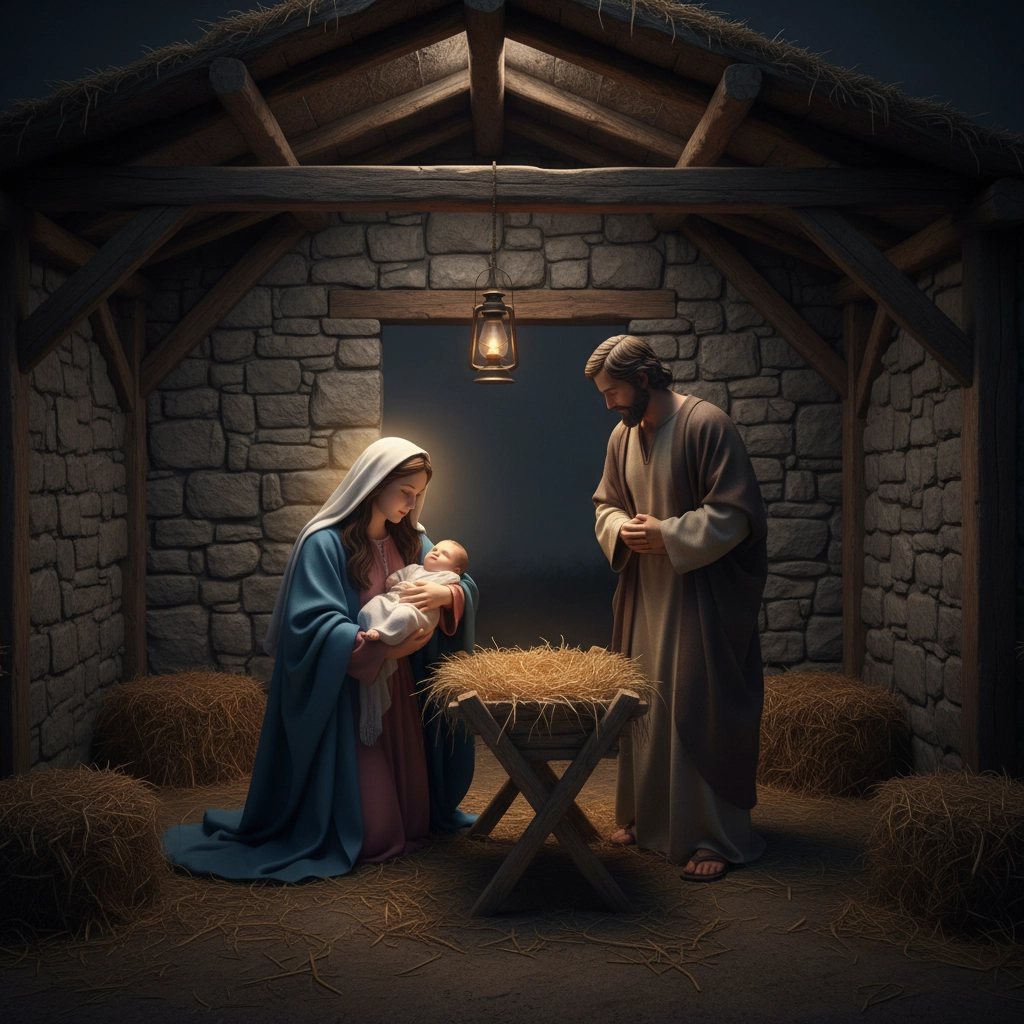
Here was the Christ child: the Word made flesh, the Light of the World, the Prince of Peace: lying quietly in hay, dependent on human care like any other infant. The contrast between the glory they'd witnessed on the hillside and the humble scene before them only deepened their wonder. This was how God chose to enter the world: not in overwhelming power, but in vulnerability and love.
Becoming the First Evangelists
"And when they had seen it, they made known abroad the saying which was told them concerning this child" (Luke 2:17, KJV).
The shepherds couldn't contain what they'd witnessed. They became the first evangelists, the first to share the good news of Christ's birth. These men, whose testimony carried no legal weight, whose word was dismissed in courts, were chosen by God to be the first witnesses of the greatest event in human history.
They told everyone: Mary and Joseph, other visitors to the stable, people they met on their way back to the fields. Their excitement was infectious, their joy undeniable. "And all they that heard it wondered at those things which were told them by the shepherds" (Luke 2:18, KJV).
The Wonder That Remains
"And the shepherds returned, glorifying and praising God for all the things that they had heard and seen, as it was told unto them" (Luke 2:20, KJV).
They returned to their flocks, but they were forever changed. The same hills, the same sheep, the same fire under the same stars: but everything was different now. They had seen the face of God's love in human form. They had witnessed Heaven touching earth. They had been chosen, not despite their lowly station, but because of God's heart for the humble.
Their story reminds us that God's greatest revelations often come to those the world overlooks. On that silent, holy night, when Heaven announced the birth of the Savior, the message went first to the forgotten ones, the simple ones, the faithful ones who were watching and waiting in the darkness.
The shepherds' wonder echoes through centuries, reminding us that Christmas isn't about the grand and glorious, but about recognizing God's presence in the humble places, the quiet moments, the ordinary nights that become extraordinary when touched by divine love.
In every silent night since, in every moment of holy wonder, we can hear the echo of their story: that God's peace comes to earth not through power and prestige, but through a baby in a manger, announced first to those who watch faithfully in the darkness, waiting for the light.








































Comments